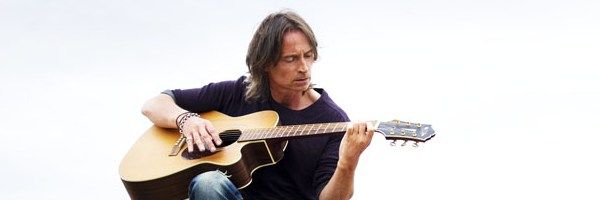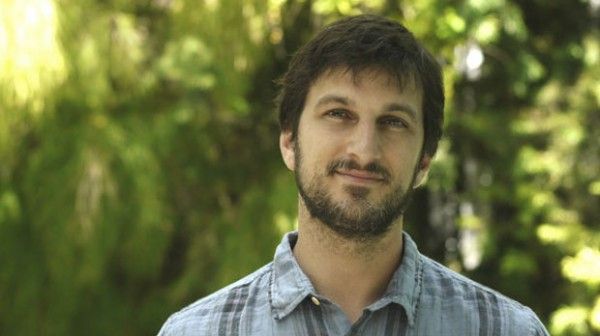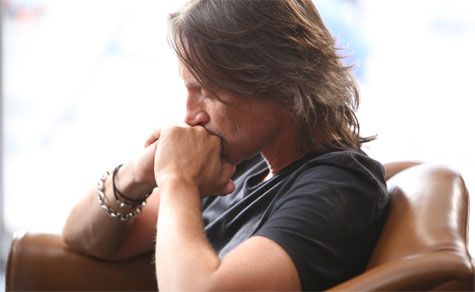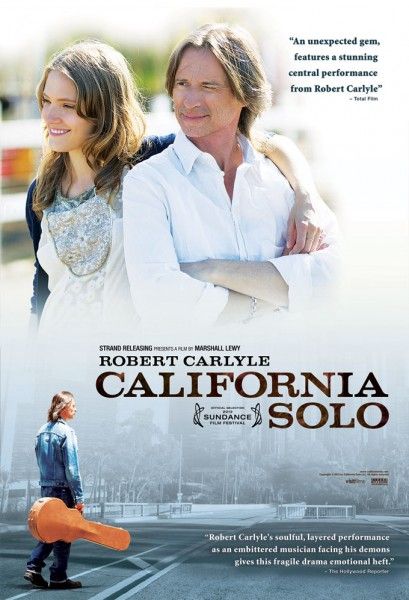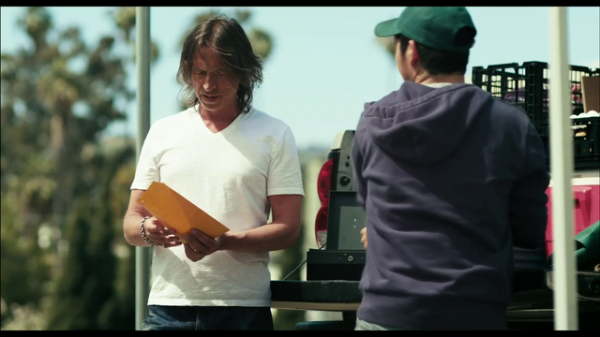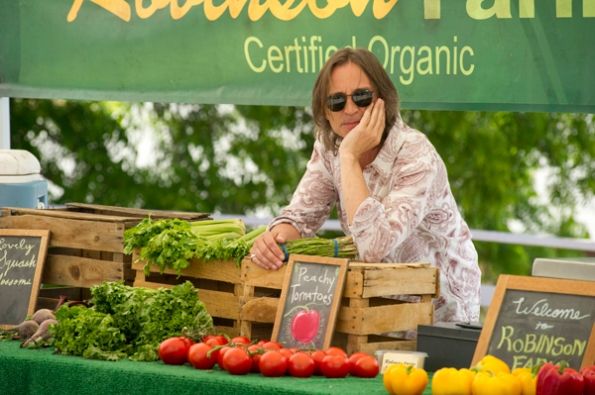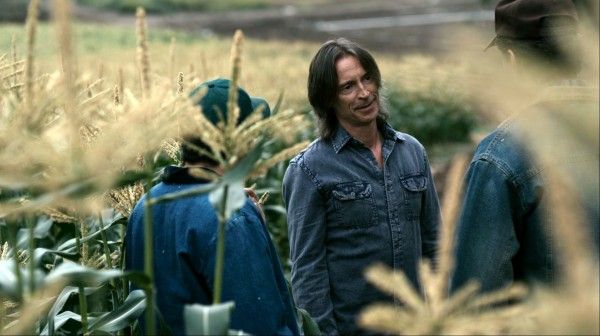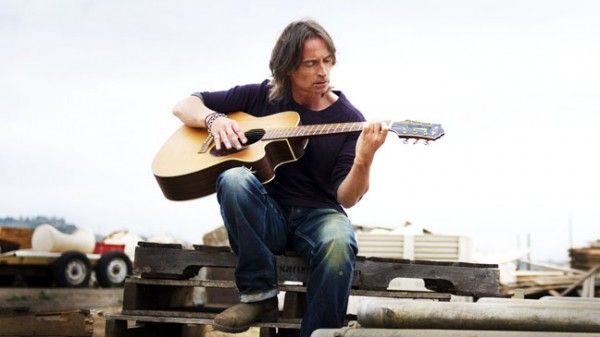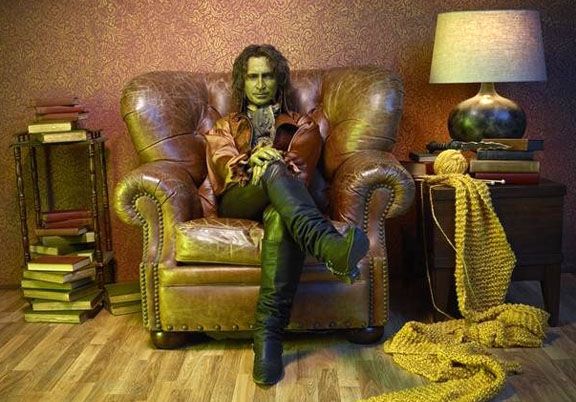The indie drama California Solo, from writer/director Marshall Lewy, tells the story of Lachlan MacAldonich (Robert Carlyle), a former Britpop rocker who has moved to farm country just outside Los Angeles to establish a comfortably quiet existence for himself. His routine consists of working on an organic farm and selling produce at the city’s farmers’ markets by day, and then recording his podcast recounting the tragic deaths of great musicians at night, until he gets pulled over for a DUI that brings up a past offense and threatens him with deportation.
At the film’s press day, filmmaker Marshall Lewy and actor Robert Carlyle spoke to Collider for this exclusive interview about how this character came about, the appeal of a role that’s so layered, how they decided to do no rehearsals prior to shooting, and showing locations around California that are not immediately recognizable. Lewy also talked about his next film, a heist thriller called Exodus, that he’s hoping to shoot in the Spring, while Carlyle talked about how much he enjoys playing the dual roles of Mr. Gold and Rumplestiltskin on the ABC series Once Upon A Time and that what’s to come on the show is just mind-blowing. Check out what they had to say after the jump.
Collider: Marshall, how did this character come about for you, and what was it about Robert Carlyle that made you decide to write it with him in mind?
MARSHALL LEWY: It definitely was an amalgam. That’s the question that I feared the most, when people started to see the movie. I was worried that people would keep asking, “What inspired you?,” and I would fumble for an answer because I wasn’t exactly sure. But, I think I have pinpointed it. The original idea came from me going to the farmers’ markets a lot and I thought about a guy who works at a farm, maybe used to live in Los Angeles, still has to come in once a week, and might run into someone he doesn’t want to run into. That was where the basis of the idea started. And then, very early on, before I started to write, I thought, “What if he was from the UK?,” and I thought of Robert. Whether or not he, ultimately, was going to agree to do the movie, just having the voice of someone specific in my head, as I was writing that part, really helped. And then, from that came the immigration story, which I started to research. The music piece was a happy accident out of, if this guy was in his mid-40's and he used to be a big British rocker, then that would put him square in the middle of the Britpop era, and that was music that I really loved when it was out. It all came together, with the music, the immigration, California and Robert. It was just mushed together pieces of inspiration.
What led you to Robert Carlyle, specifically? Had you seen something of his, at that time?
LEWY: I didn’t see a movie and say, “Oh, that’s it.” I think I just had always really admired him, as an actor. And there was something about this contrast in his performances that could be extremely charming and also extremely volatile. That, to me, was a lot of who this character was. He was a guy who coasted on his charm, and who went through life in a very subdued way, but there was always this flame that could pop out, at any moment. I found it interesting and very inspiring to play with that contrast. That’s why, of all the actors in the stratosphere, I focused on Robert.
After you spent so much time working on the script with Robert Carlyle’s voice in your mind, how did you actually get it to him?
LEWY: I knew his manager. That was my one hope. Luckily, he read it in just a couple of days, which doesn’t happen that often, he liked it, and he called me and said, “I’m sending it to Bobby.” Robert when it in a week, he called and we spoke, and that was it.
Was it nerve-wracking to wait for his reaction?
LEWY: I’ve become so numb to the process of trying to get actors in movies. I was just so pleasantly surprised that it actually got to him. The worst part of it is that, very often, no matter how good a role it is for the actor, the script doesn’t even make it to the actor and they never get a chance to really look at it. It’s a problem. I understand why there are those levels of filtering around actors, but it’s just too bad. In my experience, actors respond very differently than their reps do.
Robert, had you been made aware of the fact that this role was written for you, when the script was passed on to you?
ROBERT CARLYLE: No, but I thought, “If this isn’t going to be me, I don’t know who you’re going to get to do this,” because it sounded like me. Marshall managed to tap into an essence of me. It wasn’t me, but certainly echoes of characters I’d played in the past, who were equal parts charming and volatile. I’ve done that in the past, and I think he’d spotted that. And it seemed honest to me, as I think the film has turned out to be. It has an honesty and a believability. Those are the two major boxes that I ticked. I thought, “I like this. I’d like to speak to this guy.” That was really it, after that. It went very quickly.
LEWY: After that, not just because now we had an actor that people know, but also the way the movie and script was, to know who was playing that role was central because it is so much about that character. It just put the pieces together for potential investors, other actors, and all the people who would ultimately get involved with the movie, and we were able to go get it made.
Did you guys collaborate or have any discussions, prior to shooting?
CARLYLE: There was some improvisation, here and there, but 90% of the film is the script. The trick is to make it look as though it’s improvised. I think I managed to achieve that by not rehearsing it. I hate rehearsals. That’s the one thing I hate. Just shoot it. We shot the rehearsal and sometimes even used that take.
LEWY: Yeah, we had no rehearsal. The first take was the first time the scene was done, period. We didn’t do any rehearsal before we shot. We just had a few discussions. It was not even that many. We did a table read. Bobby, Alexia [Rasmussen] and I met at the Silver Lake farmer’s market for a day. In particular, the scenes between Lachlan and Beau, there was a good deal of improvisation, just because they had this great chemistry. There’s a lot of really great stuff that’s actually not in the film, that was just improvisation between them. We tried to let the moments breathe, and that created a real honesty and humanity in those moments that was not so much about changing the dialogue.
Were there aspects of this character that you needed to do any research about, or did he feel familiar to you?
CARLYLE: Marshall was hopeful that I would bring that with me because I know a lot of these guys. If there is any similarity between myself and Lachlan, our stars ascended at the same time. I was pretty much right in there, in the middle of all this Britpop stuff. I know a lot of the people that Lachlan talks about in the film. I’m still friends with the Gallagher brothers (Liam and Noel) from Oasis, Damon Albarn from Blur, Paul Weller from The Jam, which is a different generation but he’s still going strong, and Ian Brown from Stone Roses. I thought, “How would they be known, if they all evaporated? What kind of person would they be? Where would they be now?” That was my mantra. They could be farming on the outskirts of L.A. That’s perfect. That’s probably where you would find these guys. And the clothes that Lachlan wears were mine, and they came from that time. I brought a big bag over, of my stuff. I suddenly realized that my wardrobe is retro. But, I enjoyed bringing all of that out again and showing that. What helped Marshall on his quest to try to find Lachlan was someone who actually knew these people and knew how they would react in situations like that.
LEWY: I did not stalk Robert. Prior to writing this, I didn’t look at and read everything online. I just went off of what I remembered. A lot of it, I did after we were prepping for the film. I watched Trainspotting again and Carla’s Song, and things like that. But then, while the script was out to Robert, but before I had heard back, I did see in an article that he actually met his wife at The Hacienda, and The Hacienda was written into the script. I was like, “He’s gotta say yes. That’s too spot-on.” I didn’t know that until the script was already out the door.
CARLYLE: That’s why I thought, “If this isn’t me, it’s somebody really like me.”
LEWY: But, I wrote that without knowing.
CARLYLE: I know, and that’s just bizarre. That’s actually true. I met my wife in that very club.
LEWY: The Hacienda is the Studio 54 of the Britpop scene in Manchester.
Marshall, was it an intentional storytelling device to introduce audience to this character and have them really like him and feel sympathetic towards him, and then have him get the DUI and have things shift, so that the audience sees those other sides of him, but still wants to root for him?
LEWY: Yeah, absolutely, it was definitely intentional. I like playing around with the idea of a character who maybe does things that rub the audience the wrong way, but that you like them anyway because they charm you and you understand them. I don’t really care whether the audience likes or doesn’t like Lachlan, as long as they believe what he’s doing and are interested in him. That’s come up, over the course of showing the film to people at film festivals.
What was it like to get to show this other side of California and choose locations for the film that aren’t really recognizable?
LEWY: I’ve always loved those movies that are shot in New York or Los Angeles and you actually don’t recognize it. With The Royal Tenenbaums, Wes Anderson made a conscious decision to not shoot anything that you’d recognize as New York, even though it was all shot in New York City, in Harlem and the East Village. This is definitely a very different movie than that, but it was definitely conscious. I live in Los Angeles. I’m a transplant here. I really wanted to show my Los Angeles, from the farmers’ markets and Atwater Village to Silver Lake and Downtown, and show it in a way that’s still Los Angeles and captures that natural beauty, or the ugliness of what man has created here against the natural beauty. When we were looking for a farm to shoot at, it was very important that you also saw the freeway in the background because that, to me, was very unique to Southern California. Things like that were about trying to show that different side of L.A.
CARLYLE: That interested me, as well. It was not a reason to take the film, but it was a pleasant surprise. Even while we were shooting it, I was like, “I don’t know where I am!” Now that I’ve seen it, it’s great. A lot of people back home have seen it and said, “This is amazing!” They talk about how you can’t even recognize it as L.A., which I think it fantastic.
LEWY: Also, I want to give a shout out to the cinematographer, James Laxton, because he did a really great job in capturing that and has an eye for that. Natural but beautiful is what we talked about a lot, when we were prepping for the film.
Robert, was it fun to play a character whose emotions and temper are so tightly in check for most of the film, but then have those couple of scenes where he really loses it?
CARLYLE: I don’t think fun is the word. Those moments take quite a lot out of you. That’s another one of the reasons I don’t like to rehearse. If you can just do it in the moment, it really, really works. If you rehearse that stuff too much, you can only succeed in diluting it. You need to have that raw energy. As an actor, it’s about a believability and honesty, and that’s as close as you get. It’s hard to keep that going and keep any kind of spontaneity, if you’ve rehearsed it to death. Marshall was great, in that respect. He said, “Let’s just go and shoot it.” It’s less about the fun and more about just remembering that character’s pain when it’s happening. That’s the thing that changes, as an actor. I’m 50 now and I’ve been at the stage, for the past five or six years, where when I’m thinking of stuff, I don’t go to the well anymore. That’s what you do, as a young actor, because you don’t really have that experience. But, as life goes on, it cuts you in the teeth, here and there, and you tap into that. You say, “I’m going to sit inside that guy’s head, and not my head anymore.” Hopefully, what comes across is a believable person.
On Once Upon A Time, both Mr. Gold and Rumplestiltskin walk on the edge of likeability. Do you ever worry about how the characters you play will be received by the audience, or do you not worry about whether or not they’ll actually like them?
CARLYLE: I genuinely try not to. It’s never the actor’s place to worry about that. If they like him, great. If they don’t like him, great. It doesn’t matter to me. What’s important is being honest. So far, that’s what’s come across, particularly with Mr. Gold. You wouldn’t really want to hang out with him, at all, but somehow people have taken to his charm, or whatever it is. He would do you wrong, there’s no doubt about that. It’s interesting how it’s become that way. With Rumplestiltskin, the showrunners and chief writers, Adam Horowitz and Eddie Katsis, have been fantastic with me because they’ve said, “Just do what you want to do.” I didn’t know what I was going to do with this crazy fairy tale character that not many people know that much about. He’s got a strange name and he spins straw into gold. That’s it. I thought, “Fantastic! This is a blank canvas here. If I’m going to play on this blank canvas, it’s not going to be a pretty watercolor. I’m going to throw oils at it and just smash it like Jackson Pollock.” And that’s what I’ve done with Rumplestiltskin. I’ve just thrown everything, including the kitchen sink, into that character, and it’s worked. It could have went badly wrong, but the audience is just nuts for him. I’m enjoying playing him, and that probably comes across.
Has it been great to play all the twists with the fairy tale stories?
CARLYLE: I love that. I think that’s the genius of it, if that’s not too big of a word. They can take these well-known fairy tales and go, “Well, actually, maybe it wasn’t the fairy godmother that sent Cinderella to the ball. Maybe it was Rumplestiltskin.” And then, suddenly, it’s a whole different story.
What can you say to tease what’s to come when the show returns in January?
CARLYLE: The stuff that’s coming up, that I’m just about to do in the next three or four episodes, is mind-blowing. It just takes it somewhere else again. I was like, “Oh, my god!” You actually will feel sorry Gold. There’s his love for Belle and he’s trying to be a better man, but we’ll see how long that lasts.
Marshall, do you know what film you’ll be doing next?
LEWY: I have a film, called Exodus, that I was actually supposed to originally shoot before [California Solo], that is reformed and shooting in the Spring, in the Caribbean. It’s a character-driven heist thriller.
Are you casting for that now?
LEWY: We’re in the middle of it, yeah.
California Solo is now playing in select theaters.

